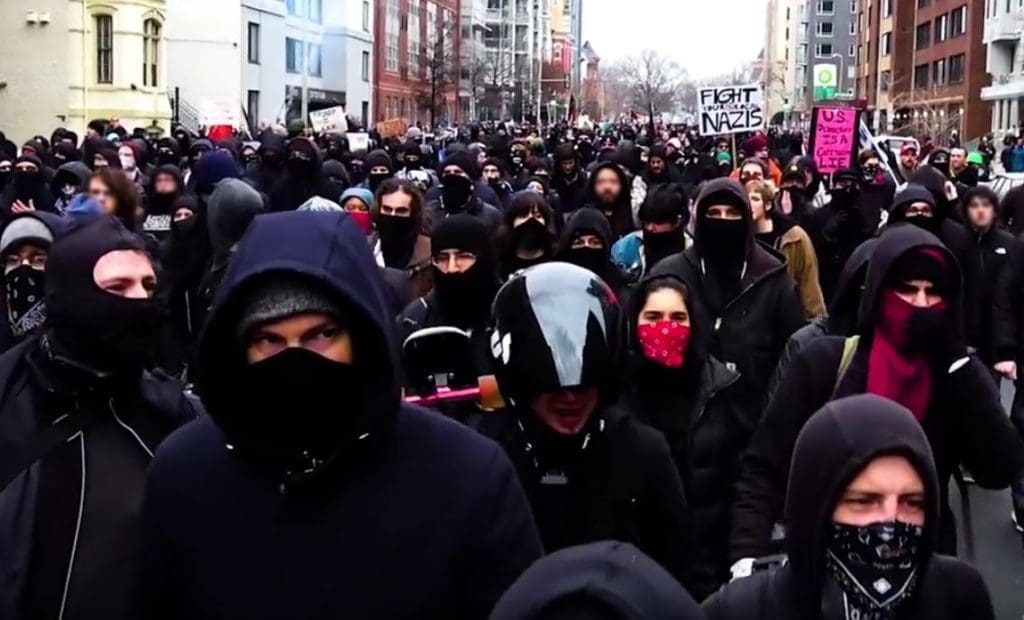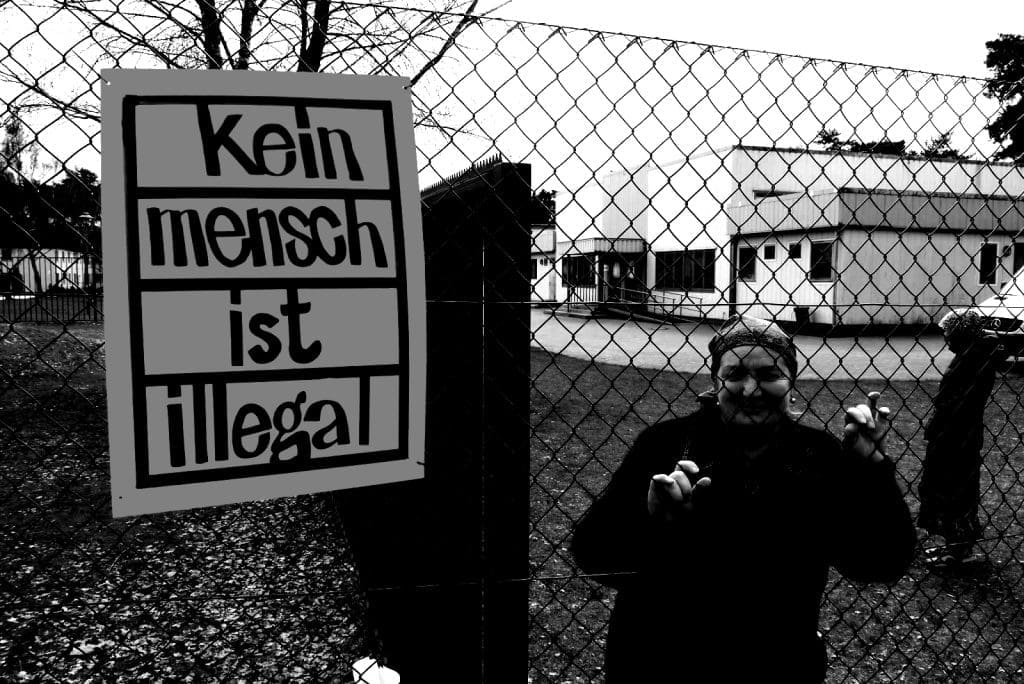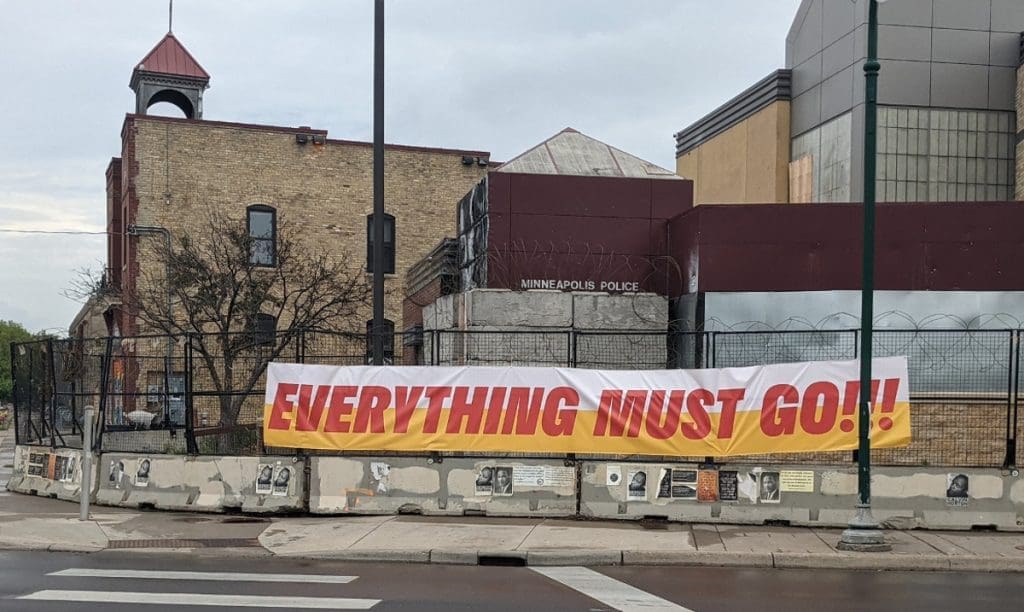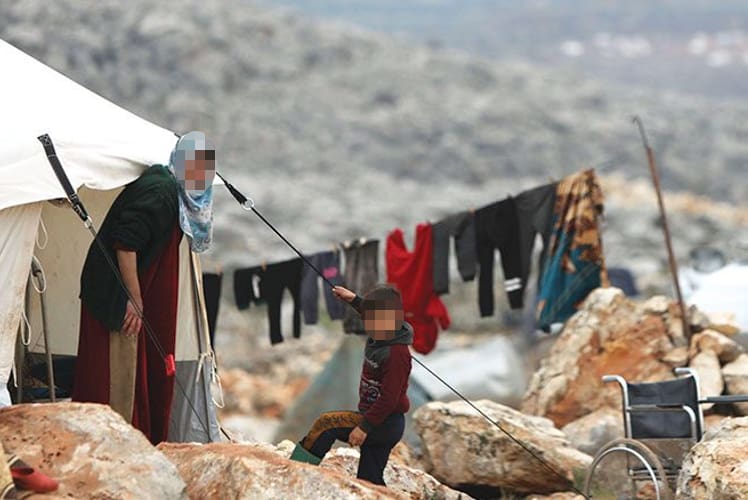AntiNote: Have we lost our way?
Beyond the effects of increased repression and material deprivation over the last year and a half (which are still far from maxing out), the accelerating speed and intensity of the churn of events and news cycle concern us greatly here at the zine. To an extent, yes, it’s always been this way, but the hyperdrive we’re all riding now is unprecedented, and it’s also been having noticeable negative effects on organizing, education, and resistance in our communities. The general predicament has been so disorienting, conflict-inducing, exhausting, demoralizing, painful, and overwhelming that many are taking a break, or dropping out for good—and many who continue the slog are losing the thread.
So we figured it’s about time for a breath and a check-in: Where are we? How are we doing? Hi, hello.
Upon the election of Trump there was naturally an immediate flurry of “What are we facing and what should we do?” conversations on Turtle Island. Some of them, judging now in retrospect, made better predictions and prescriptions than others. The following is an extended excerpt of one of the more lucid of these conversations, and could make for a good measuring stick, a reminder of the tasks we originally set out for ourselves and the principles guiding us, in case we feel we might have drifted away from them. Apologies if it seems bleak.
Transcribed from the 15 November 2016 episode of the IGDcast and printed in a spirit of well-meaning autonomy. Edited for space and readability. Listen to the whole interview (as well as a shorter one with Daryle Lamont Jenkins on the same topic) here.
—Antidote Writers Collective, 14 June 2018
To avoid getting caught completely off guard any more than we already have, we have to expect that the fascist insurgent right is going to continue to grow in size, coordination, and militancy.
IGDcast: On today’s show we have an interview with James, a long-time antifascist and anarchist. We talk about antifascism, Trump, building community self-defense, and what the coming terrain is going to look like: what to expect from the far-right, the alternative right, white nationalists, neo-Nazis and that whole crowd, and moreover how to develop a strategy in the coming time under the Trump regime.
James, when did you start really paying attention to this newest neofascist resurgence? When did you start seeing it taking shape as it is now?
James: I remember when the Republican primary race was getting into the swing of things, and Trump made the announcement that he was going to ban Muslim migration to the United States, and require Muslims to register on some sort of central database. I had heard the things that Trump had said before (I had been tangentially following the race), but this in particular struck me as outside the political mainstream. When he said that, a lot of people thought Trump’s campaign was finished. “He’s gone off the deep end now! He’s gone too far!”
The standard political maneuver in that situation is to publish some sort of apology two days later, a retraction; muddy the waters and say, “He didn’t really mean that, he was talking about something else.” Instead, two things happened that I thought were significant. One, Trump doubled down on what he said. He said that he would absolutely ban Muslim migration to the United States, and he would absolutely require Muslims to register. The second thing was that his support base didn’t flinch. The subsequent polls showed him holding steady or even increasing a little bit. America was okay with what he was saying, or at least a significant portion of America. That’s when I realized that this was something new, something that was dangerous and that wasn’t going to go away easily.
The Onion posted an article around that time that I thought was pretty funny: “‘This Will Be The End Of Trump’s Campaign,’ Says Increasingly Nervous Man For Seventh Time This Year.” It really characterized a lot of the left response, and the center-right response, both in the months leading up to that and the months since. There was a complete denial that any of this was possible, and this continuously moving benchmark where everybody said, “Trump won’t make it past the first primary, Trump won’t make it past Super Tuesday, Trump won’t get the nomination, it’s going to be a contested convention,” and then Trump gets the nomination and it’s “there’s no way Trump can win, he’s unelectable.” Up until eight or nine o’clock at night on the night of the election, everyone was still saying there’s no way that Trump can win.
Back in June, I remember telling people that I thought Trump was going to win the election, that I didn’t think Hillary was a good candidate to run against Trump. Her weaknesses played to all of his strengths. But even after making that prediction, through September and October I got more complacent, and started buying into the mainstream narrative, all the polls and projections that said Hillary Clinton had a ninety-three percent chance of winning. I got really complacent, so even though I had seen this possibility six months earlier, when it actually happened it still caught me by surprise.
IGDcast: How about his fascist base moving forward? After George Wallace lost in 1968, the National Alliance grew out of the National Youth Alliance for Wallace. What do you think will happen with all the white nationalists that supported Trump? Their rallying factor is gone. Trump is now the head of the new regime. What is going to unite them, and how do you think they’re going to act in the coming period?
James: To avoid getting caught completely off guard any more than we already have, we have to expect that the fascist insurgent right is going to continue to grow in size, coordination, and militancy. I think that the conditions are ripe for that to happen, and I think the threat of extralegal rightwing violence is very present right now, and is only going to grow.
Trump’s election has dramatically validated their positions. Many white nationalist, neo-Nazi, fascist organizations endorsed Trump; they campaigned, agitated, and advocated for Trump. Their support of Trump didn’t cost him political capital in a serious way, and his endorsement of their positions—even if it was tacit, with a wink and a nod—strongly validated and energized them. That gives them a lot of momentum to continue recruiting, continue organizing, and continue pushing further and further. When you win a little bit, it whets your appetite to win a lot more.
So the fascist right could very well continue to grow in numbers, coordination, and militancy. That threat is very real. The other component is that we’re faced with the possibility of fascists getting appointments in the federal government. The New York Times has speculated that Trump’s campaign manager Steve Bannon, the CEO of Breitbart, might end up as his chief of staff in the new administration. It would be somewhat unprecedented for someone that far to the radical right to get a high level spot in government and help carry out a white nationalist agenda in a very overt way.
There are plenty of liberals who think Trump will be more of a team player once he gets into power, that maybe things won’t be as bad as we’re all afraid of. Frankly I think that’s bullshit, and naive. But even if it were to come to pass, that could also embolden the radical right. If they feel sold out by Trump, abandoned and betrayed by him, that leads down a lot of dark, scary roads as well in terms of grassroots fascist violence.
IGDcast: What do you see them doing and organizing around in the coming months?
James: The number one thing is anti-immigration action. That was one of Trump’s most consistent threads throughout his campaign. It’s how he opened his campaign, saying he’s going to build a wall, stereotyping and criminalizing Mexican migrants, and his plan is to try and deport three million people almost immediately when he gets into office. That’s something that a lot of the fascist right and the people who voted for him are very adamant about holding him to.
Over the last decade, we have already seen anti-immigration as a unifying theme, with the fascist right using immigration as their route to the mainstream, white nationalists recruiting from more mainstream anti-immigrant groups, white nationalists holding rallies specifically focused around the issue of immigration, and militias that go down to the border to play commando with the border patrol for the weekend. Mother Jones published a long exposé recently; one of their reporters infiltrated one of the Three Percenter patriot militias down on the border. Immigration is a huge issue for all parts of the grassroots insurgent right, and that’s going to be one of the big struggles as Trump comes to power.
Repression works, it demobilizes people. But that’s not absolutely inherent: if we anticipate the repression, plan for the repression, organize in ways that are resistant to that repression, then we can maintain momentum and show people that we have both the ideas and the praxis to advance issues of liberation and justice.
IGDcast: Let’s talk about that, because just today Trump did his first interview after becoming president-elect, and he said he was going to deport two to three million people. How do you see that process playing out if he does pursue it? Do you have any ideas about how people could respond? You brought up that we should basically prepare for the worst—so what does that look like right now? If tomorrow we wake up and see that it’s beginning, what would we see? And how should we be preparing for this?
James: We need to have a strategy of massive resistance to the horror show that Trump is bringing to bear. It needs to be widespread, broad-based, incredibly disruptive, and incredibly focused and dedicated. In terms of what specific actions, that depends on where you are in your local context. But people have already been lobbying their city governments for non-collaboration with immigration authorities on the city level. That’s a very through-the-system response, but I think any jail that ICE can’t get into is a huge victory for interrupting Trump’s plans. That’s where he’s going to start. The low-hanging fruit is to have ICE agents in county jails so that when migrants get picked up for silly things, Immigration is there to kidnap them and start the deportation process.
If he’s looking for a “shock and awe” strategy, he could just start right away by raiding workplaces, trailer parks, and barrios, and just rounding people up at random. But if he’s looking for a way to ease the American public into this mass deportation—basically an ethnic cleansing operation—I think he’ll start in the county jails.
As it stands, not every single criminal offense leads to automatic deportation. People who get picked up on traffic stuff sometimes end up getting transferred to immigration authorities, but sometimes you just get released on bond, and you end up not going through that rigmarole. But if Trump starts in the county jails, checking every brown person or person with a Spanish surname in the immigration databases and just deporting everybody that comes through, that gives him a veil of legitimacy. He can say we’re only deporting “criminal aliens” because we’re only picking them out of the jails. Once that operation is underway, maybe then the workplace raids start.
IGDcast: Over the past week we’ve already seen massive resistance. People are already referring back to when SB1070 was coming down the chute, or HR4437 in California—people in immigrant communities are talking about getting organized right now, and organizing resistance. If there were a coordinated ethnic-cleansing assault on working-class brown communities, there’s going to be a response. Look at what’s happening in LA. Do you think that Trump really wants to tangle with that?
James: I think he does. He loves the conflict. He loves the attention. All of that feeds his ego, energizes him. Trump himself isn’t personally going to be dealing with this resistance. It’s the police—all the police unions that endorsed Trump—that are dealing with this. Trump gets to watch it from the safety of the white house. In some ways, the resistance will embolden him.
We’ve seen a lot of resistance in the last four or five days since his election, but it’s been somewhat symbolic resistance: marching, clashes with the police, some property destruction—none of that is fundamentally interrupting the apparatus of the immigration system. I haven’t seen any actions with people locking down at ICE detention centers so nobody comes or goes. I haven’t seen people sabotaging the apparatus of immigration enforcement. When we talk about massive resistance, it’s got to be massive—but it’s also got to be focused, it’s got to be relevant, and it’s got to be effective. A hundred thousand people marching quietly through the streets isn’t going to do anything to stop deportation raids and roundups.
The other thing is that this is all connected with the private prison industry. It was big news when the federal bureau of prisons decided they were no longer going to contract with private prisons, but a lot of those contracts for detention centers just got flipped over to the department of homeland security. The Corrections Corporation of America’s stock went through the roof right after Trump got elected, because they know there’s going to be more roundups, more detentions, and more incarcerations, and that means more bodies to fill the prisons they’re running and more money in their pockets.
There are endless points of intervention in this, but we have to find those points, we have to investigate them, and we have to put ourselves in the path of the machinery.
IGDcast: Can you speak to the disarray of the Democrats? In my mind, it’s a good thing. It allows people like us to say, “Well, shit, look, it didn’t work. You guys are a total shitshow and a failure, and your inherent nature prevents you from offering anything positive for working people.”
James: Sure. Nonetheless, what we saw during the Bush administration was not mass disillusionment with the Democratic Party and a turn towards greater degrees of radicalism, but rather a popular front to fight back against Bush. There were punk rock groups like NOFX and Anti-Flag that started shilling for John Kerry as part of their Anybody But Bush campaign, which was an utter fucking disaster and led to electoral defeat and nothing else in particular.
But we do absolutely have an opportunity, and it’s our opportunity to lose. We have to get our shit together and seize that opportunity. Periods of repression and hardship don’t always translate into more resistance. That’s the unfortunate reality. Repression works, it demobilizes people. But that’s not absolutely inherent: if we anticipate the repression, plan for the repression, organize in ways that are resistant to that repression, then we can maintain momentum, maintain our organizing, increase our recruitment, and show people that we have both the ideas and the praxis to advance issues of liberation and justice outside the electoral process. That can be really effective.
But we also have to realize that a lot of Democrats, a lot of liberals, are going to spend the next four years figuring out how to beat Trump in the next election—and some of that is going to involve selling out the radicals in the streets; some of that is going to involve co-opting the radicals into more electoral and mainstream efforts. We have to be ready for that.
The future is up for grabs; there is a definite opportunity for the radical left in the US right now—but I don’t think that Trump’s presidency is at all a good thing. Based on what I’ve seen, the left experiences better growth and better recruitment when there’s a Democrat in power. When they’re in power, they’re exposed for all their false promises. They are shown not to be able to deliver on what they said. Obama is a pretty perfect example of that. When people get disillusioned with a Democratic president who’s in power, they go into the streets. With Trump they might just stay home and hide.
We’re not going to come through this unscathed. But if we can mobilize and organize the people in such a way as to build mass non-cooperation and mass resistance, we might stand a chance.
IGDcast: Let’s try to end on a good note. What do you see as the major tasks of the present moment, to get ready for what’s coming?
James: A huge piece is movement defense. I mean that in the most expansive way possible. Some of that is doing anti-repression work, anticipating FBI raids on radical spaces, grand jury subpoenas, political prosecutions, things of that nature. We need to up our anti-repression game, up our legal-support game, have those things in place before the hammer comes down on us, and organize in ways that minimize the openings for that repression. Legal support is always a huge issue. We need to be cultivating relationships with sympathetic attorneys, raising money for bail, raising money for legal fees—ahead of time, so we’re not doing it after the fact while our comrades are sitting in jail or prison.
Self-defense is a huge piece. The threat of rightwing violence from non-state actors is huge. If the state is focused on their immigration raids and the larger social control piece, then the grassroots right takes up the role of attacking the radical left, doing what they can to destroy our organizing. We’ve already seen that over the past year: the shooting of anti-police protesters in Minneapolis last February; the stabbing of anti-Klan protesters in Anaheim last spring; the stabbings at the anti-Nazi rally in Sacramento over the summer. There has been all this violence against the left. Of course there’s been a lot more violence against non-overtly political communities, Muslim communities, Mexican and Central American communities. There’s been a lot of violence against them, too, but there’s been plenty of violence against the left, and the left is terribly under-equipped and under-prepared to defend themselves against that violence, whether it’s unarmed self-defense when you meet an alt-right crew at the local bar, or armed self-defense when they come by doing nightrides outside our homes and organizing spaces. All of that is going to be incredibly important, and it’s something we’re pretty far behind on.
Another piece is first aid. With those stabbings in Sacramento, there were street medics there who knew their shit and were prepared to administer really high quality first aid for people who had been stabbed, and probably saved people’s lives. That’s something that every community needs at every mobilization, because we have to expect that there’s a potential at all of these actions that somebody’s going to get stabbed, somebody’s going to get shot, that something bad is going to happen and we need to protect our people.
Another huge piece is coalition-building: having a broad base of support, being able to draw on different communities and different resources, working with all the different communities that are coming under attack, migrant communities, Muslim and middle eastern communities, black communities, all the different parts of the left in the United States—we’re a lot stronger when we have each other’s backs, and that organizing doesn’t come easily. There’s a lot of historic obstacles that we have to overcome in terms of suspicion and distrust, and bad organizing practices in the past. It takes time to build trust and solid collaboration, but that’s work we need to be doing, because if we don’t have each other’s backs then we’re all a lot more vulnerable.
One thing I will say about this moment is that people I haven’t seen or heard from in years are coming back out of the woodwork; old-school antifa people who haven’t been active in a long time are texting me for other folks’ numbers: “I’m getting the band back together, shit’s about to get real, I want to be there for it. I realize how serious this is. I realize I haven’t been around, and I’m ready to step back up into this game.” That’s really heartening to me, and we have to embrace that and be ready for that.
By the same token, people who haven’t ever been involved before, who are suddenly shocked into awareness of what’s happening—we need to bring them into the fold also, catch them up on the political education, understand why we don’t negotiate with fascists, why we don’t talk with cops, instilling that culture of resistance into as many people as we can, and bringing them into the fold. All that new energy and all those new ideas are really valuable.
We should also realize that while new people might have a lot to learn from us, we also have a lot of learn from them. Our circular thinking sometimes gets the better of us, and it’s dangerous to assume that just because somebody hasn’t been involved in the left for very long that they don’t have anything to offer. Sometimes there’s an impulse to be really self-righteous, like, “Where were you?” But this is absolutely not the time for self-righteousness. It’s time for a whole lot of humility and a whole lot of hard work. Because if we’re going to make it through this (and I don’t think that’s a given), it’s going to take all of us.
The other thing is that antifascism cannot be a single issue. Every bit of work that we’re doing on the left now has to be antifascist. Yeah, we’re going to have antifascist crews popping up—it’s good to have those crews, people who are specialized in doing intelligence, outing fascists, fighting fascists, that’s really important—but we can’t stop doing the other things that we’re doing either, the food projects, the housing projects, the anti-prison projects. All the different things that anarchists and radicals have been doing for decades have to keep going, but we need to bring antifascist analysis to it. What do these projects contribute to antifascism? What is the threat of fascism to these projects? How do we defend each one of these projects to keep them going? How do these projects get back to the larger antifascist struggle?
The lesson from Spain and throughout history is that you can’t put aside the revolution for the sake of the war. Antifascism without revolution falls into the trap of liberalism and voting for Hillary Clinton, and that’s not going to take us anywhere. By the same token, revolution without antifascism…look, the fascist right can be revolutionary. There are threads of fascism that play as radicalism, present as anti-capitalist and anti-statist, but still have authoritarian underpinnings. So revolutionary ideas have to be antifascist. We need both revolution and antifascism to weather this storm.
We have some advance notice for this coming horror show, and we have a couple months to get ready for it. Getting ready means getting defensive, reaching out to people, bringing people back into the fold, building up our skill sets, getting back in shape, brushing up on our organizing practices, our security practices, getting in touch with the lawyer who represented us on that thing seven years ago, who we might need next week when everything goes to shit again.
The other thing is planning a strategy of mass non-cooperation and mass resistance, and building a diversity of tactics into that strategy so that we’re not constantly arguing with liberals about this stupid issue of violence or nonviolence. Our goal is to stop the fascist resurgence, and some of that is going to be ugly. Some of that is going to be violent. We’re going to catch some of that violence, and we’re probably going to have to deal some of it out too. We’re not going to come through this unscathed. But if we can mobilize and organize the people in such a way as to build mass non-cooperation and mass resistance, I think we stand a chance. Nothing is inevitable either way, so the future is up to us to decide what happens. As a friend of mine always said, “Know your history, dream the future, organize your people, and fight to win.”





